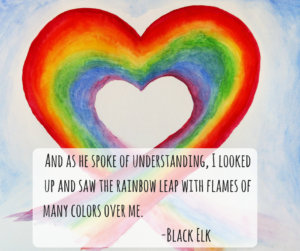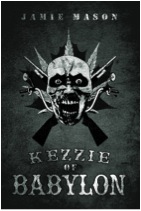 Treading the waters of diversity is tricky because we never want to disrespect the struggles that women, people of color, the LGBTQ community, or others have had to endure. As writers, we often want to include people like this in our stories because their stories are powerful and can make a difference. This sometimes manifests itself as ‘the gay friend’ or ‘the black friend’ or if you’re really batting for a home run ‘the gay black friend’. This character is great for diversity. He shows that those people exist and that we shouldn’t be afraid of them. But over time, if we see the gay black friend over and over it creates a subliminal message that all gay black men behave a certain way, and that can damage the community. I think we should allow those characters to break the mold and keep it to themselves.
Treading the waters of diversity is tricky because we never want to disrespect the struggles that women, people of color, the LGBTQ community, or others have had to endure. As writers, we often want to include people like this in our stories because their stories are powerful and can make a difference. This sometimes manifests itself as ‘the gay friend’ or ‘the black friend’ or if you’re really batting for a home run ‘the gay black friend’. This character is great for diversity. He shows that those people exist and that we shouldn’t be afraid of them. But over time, if we see the gay black friend over and over it creates a subliminal message that all gay black men behave a certain way, and that can damage the community. I think we should allow those characters to break the mold and keep it to themselves.
Gender identity, skin color, and sexual orientation don’t affect your ability to do things. Period. There’s no reason a gay man can’t be a hardened combat veteran and there’s no reason a straight man can’t enjoy ballet. The fact that we use these stereotypes reflects our perceptions of society. It acts as a shorthand for the reader / viewer to go “Oh, he’s the gay guy, I get it!” and we can immediately paint a picture of who that person is without digging any deeper. While it’s great to include someone like this in your story, you may actually do more harm than good by treating them this way. Why? Because you’re adding to society’s confirmation bias. If every time someone sees a gay man on TV or reads about them in a book and they behave like a giddy teenage girl, then we will continue to think that’s how all gay men behave. Not that there’s anything wrong with a flamboyant personality, but it can be an oversimplification of the gay community.

What if, instead, we put a gay man in a position of power? The NBC show Brooklyn 99 does this with the character Captain Raymond Holt. He’s a stoic, calculating man that comes off cold but everyone loves him anyway. Just because he lacks flamboyance doesn’t make him any less gay. He still has a pride flag on his desk and there are many episodes with his husband, but he’s not treated any different because of his sexual preference. Yes, there are some episodes about his struggles as a gay black man in the NYPD because that is a story worth telling, but his skin color and sexual orientation never interfere with his ability to perform his duties. That’s because they literally have no bearing on his performance, and his entire team treats him the same as they treat everyone else. Imagine the impact that has for people who have never met a gay man like him. For some people, it never occurs to them a gay man could behave that way. For some people, that character is eye-opening and possibly life-changing.
Wizards of the Coast, a gaming company that owns Dungeons & Dragons and Magic: The Gathering (among others), often portrays people of color as their flagship heroes. They even have several prominent non-binary characters, which they’ve supported despite friction from some members of the community. Imagine the impact when someone who’s never played one of these games, in an industry that has traditionally been dominated by white dudes, thumbs through one of the rule books and sees a heroic character that looks like them. The imagination stirs as we consider the possibilities of being that character. It makes us feel like we could be part of that adventuring group, part of the epic story that will be written as a legend in years to come. All because of some simple artwork!

Placing these characters front and center, without necessarily making their differences the focus of the narrative, can have a profound effect on society. By having these characters represented in our stories we are saying, “This is how life is, these people exist and they don’t need to be treated any different than you or I.” This silent diversity becomes powerful representation for these communities. It reinforces the idea that we are all equal. If a child sees a hero that looks like them on the cover of a book, or on a movie poster, it tells them they could be that hero. It tells them there are other people with their unique traits in the world and that those people can accomplish great things. It tells them they aren’t alone.
You know what’ll never get old? Seeing representation in games. I used to be one of those people that said it didn’t matter but every time I see someone that looks like me on screen its a feeling like no other. pic.twitter.com/FwdP5rukHE
“” ThatBronzeGirl (@ThatBronzeGirl) November 20, 2019
Does this mean you can’t tell a story about a person of color’s struggles? Of course not. Am I suggesting that a woman’s climb to the top of her field isn’t worth hearing about? No. I’m saying that if we fast-forward through the struggles these people face every day and portray them as successful heroes then maybe society will treat them like heroes. In the end, we all want equality. We want a world where our gender identity, skin color, sexual preference or any other part of our being is accepted without a second thought.
Why not nudge society in that direction by telling stories where that is already true?
BIO: Kyle Winter is an author who is terrible at writing about himself, especially in the third person. He considers himself a genre-fluid author, dabbling in science-fiction, fantasy, pulp and others. He is an avid gamer, whether it be video games, tabletop RPGs, miniatures, board games or card games nothing is safe. For the past nine years he has routinely gotten beat up at his Brazilian jiu-jitsu classes and enjoys every second. You can visit his website www.TheKyleWinter.com or connect with him on Twitter @TheKyleWinter.
If you’re an author or other fantasy and science fiction creative, and want to do a guest blog post, please check out the guest blog post guidelines. Or if you’re looking for community from other F&SF writers, sign up for the Rambo Academy for Wayward Writers Critclub!










